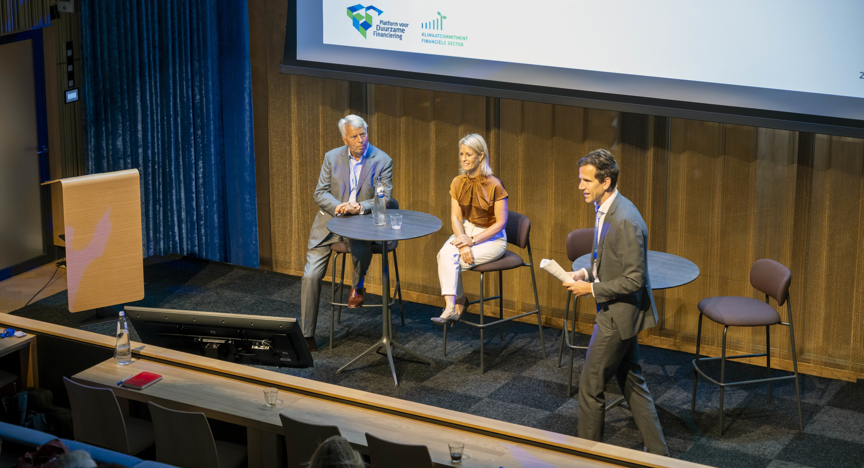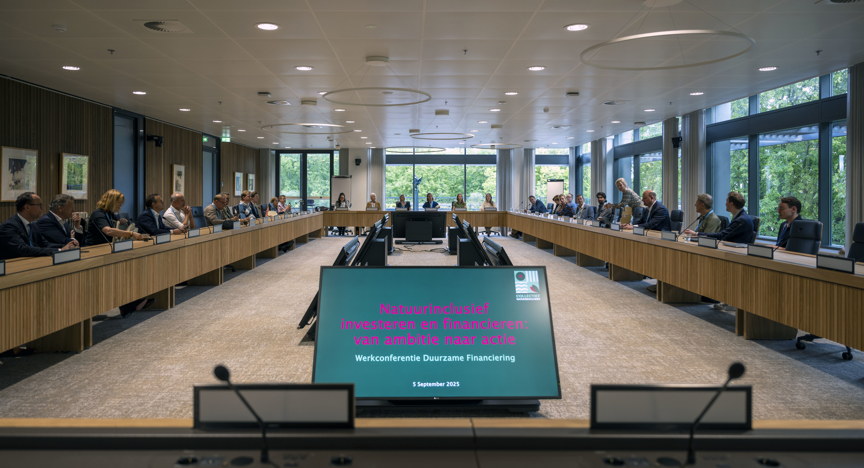We must press ahead: sustainability is not a choice
With over 140 participants from finance, government, science and civil society, the Sustainable Finance Working Conference underscored one message: sustainability is no longer optional – it’s imperative.
Published: 08 October 2025

© DNB
The theoretical discussion is over. This was the clear message from Cindy van Oorschot, Chair of the Sustainable Finance Platform, and Peter Blom, Chair of the Financial Sector Climate Commitment, at the opening of the Sustainable Finance Working Conference in September. Sticking to sustainable policies is not only logical but necessary, they argued in their plenary opening remarks, signalling the kick-off to a lively conference. The day featured a range of perspectives, with an emphasis on effective cooperation and suggestions for improvement.
This is a carousel with one large image and a track of thumbnails below. Select any of the image buttons to change the main image above.

1/4 -

2/4 -

3/4 -

4/4 -
Tim van Hattum of Wageningen University & Research fiercely emphasised the urgency of sustainability. He expressed this urgency in his keynote, while also calling for a new narrative of hope and action. "The world is on fire, but we are mostly mired in myopic, short-term thinking," he argued. His plea: a vision for the future based on seven natural routes, including ‘moving optimally with water’. This 'NL2120' vision, visualised in a map of the Netherlands a hundred years from now, shows that choices about investments and the use of available space made today will shape the world of tomorrow. This vision isn’t new. But today, it feels more relevant than ever. "We have a huge responsibility, particularly as a prosperous, western country," Van Hattum said. "The financial sector must also take that responsibility."
This sense of urgency carried into the panel discussion, where it became clear that the resources and solutions needed for the energy transition are available, but that cooperation and coordination are crucial. Jellie Banga (Invest-NL) stressed her organisation's role as a bridge between government, the financial sector and the real economy. John Landman (Pensioenfonds Zorg en Welzijn) highlighted the importance of transparent communication with members when it comes to SRI. Edward Feitsma (VNO-NCW MKB) outlined infrastructural and operational bottlenecks such as grid congestion and demand creation. Kim Solberg (Ministry of Climate and Green Growth) put the accent on the importance of cooperation: "The government cannot do this alone."
Building on these insights, participants split into break-out sessions to put the day’s topics into practice. For instance, a session on carbon data, led by PCAF, revolved around data quality and transparency. The biggest challenge turned out not to be the data itself, but the decision-making based on the data. The session on funding tables revealed that cooperation becomes more effective when parties with similar mandates come together. Appropriate pricing of physical and transition risks is essential to enable these parties to engage in effective decision-making.
Participants also looked at actual case histories. Using the Fact sheet on Climate adaptation for industrial sites , they discussed how banks, insurers and investors can get started on climate adaptation, together with governments and businesses. Conference goers also used the Manual on Nature-Inclusive Investment and Financing to explore options for financing an agricultural fund, urban development and an offshore wind farm. The recent renovation of DNB’s Amsterdam offices (the conference venue) served as an illustration of sustainable choices and commitments put into practice, both in terms of circular material use and community engagement.
The conference made one thing clear: the financial sector is no longer at the beginning of the transition, but in the thick of it. The question is not if, but how. Answering that question requires vision, collaboration with government, science and civil society organisations, and action. And the time to act is now.
Discover related articles
DNB uses cookies
We use cookies to optimise the user-friendliness of our website.
Read more about the cookies we use and the data they collect in our cookie notice.